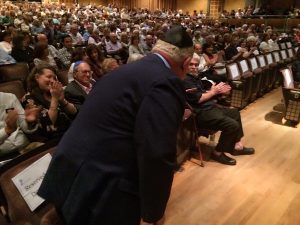Fear is part of being human, but as we struggle to find our way through life’s rough waters, we know we’re never alone, even if we don’t have all the answers.
Rabbi Yael Splansky
Holy Blossom Temple, Toronto
Rabbi Mark Fishman
Congregation Beth Tikvah, Montreal
Rabbi Fishman: We’re told that God did not lead the Jewish People out of Egypt in a direct manner, but rather took them on a circuitous route. This was done so that if the people saw war, they would be afraid and wish to return to Egypt. Miracles are a dime a dozen, but God has to work with the human heart and realize all of our human foibles and fears.
As one commentator has put it: “God is able to change nature, but He can’t change human nature.” I think it’s natural for a person to have fears and concerns and worries, and having faith does not necessarily equate with having clarity and confidence. Actually, living with faith includes uncertainty.
Rabbi Splansky: The most often-repeated mitzvah in the Tanach is: “Thou shalt not fear.” More than 120 times we are commanded: “Be not afraid.” When Avram sets out into uncharted territory, he is told, “Al tira.” When Hagar is about to give into her loneliness and despair, an angel of God calls out, “Al tir-ee.” At the shores of the Red Sea as Pharoah’s army is advancing, Moses says “Al tira-u.”
Our ancestors heard these words just when they needed them most. Some say this is evidence that God is a “crutch,” a fabrication born from human need. More likely, I believe, our vulnerability opens our eyes to many realities we weren’t able to see before. A time of personal trial opens our ears to better hear God’s consistent message, as spoken to Isaiah: “Fear not, for I am with you. Do not be frightened, for I am your God.”
Rabbi Fishman: I was always taught that when someone writes that they are not afraid, it is usually a sign they’re trying to supress their fear. Yet this is a comfort for me. A person of faith continues to live life notwithstanding hesitations about what tomorrow may bring.
This is how I understand the concept of living in a relationship with God. Not that a supreme power takes away all doubts and uncertainties, but rather that God allows us the companionship. As we struggle to find our way through life’s rough waters, we know we are never alone.
Rabbi Splansky: Rabbi Joseph Soloveitchik admits: “I know that I am perplexed, that my fears are irrational, incoherent. At times I am given over to panic; I am afraid of death… I don’t know [even] what to fear, what not to fear; I am utterly confused and ignorant.” But when a psychiatrist who deemed all fears to be unhealthy asked Rabbi Soloveitchik if the concept of yirat HaShem (fear of God) should be omitted from the High Holiday prayer book, he answered: “I am not a psychiatrist, but I know that fear is a part of being human. Everyone has fears – fear of failure, fear of rejection, fear of loss of wealth, of health, of life itself. There is, however, one great fear that pushes away all the other smaller fears. What is that fear? It is fear of the Holy One, Blessed be God.”
I know many good people who would say of themselves, as did Sigmund Freud, “I am resigned to the fact that I am a God-forsaken non-believing Jew.” But if “Do not be afraid” is a mitzvah, we must take up the challenge to consider how to fulfil it. How might I hold these words in my hands? And how might these words hold me? How might they place me in God’s hands?
Rabbi Fishman: The first word of the Ten Commandments is “Anochi” (“I am”). The 19th-century chassidic Rebbe of Ishbitz commented that “I” in Hebrew can be written as “Ani” or “Anochi.” The one-letter difference between them is the kaf, which in Hebrew means “like” or “as if.”
In the very moment of revelation, we were introduced to a God who still was only showing us a small sense of who He is. We can never really know God. Our understanding of so much in our world will always be incomplete. Even when we think we may know something, there are still gaps.
Belief in God doesn’t mean always having the answers, but living with the questions. This, too, is Jewish faith, and it is the most authentic approach I know.








